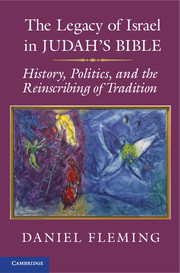Book contents
- Frontmatter
- Contents
- Preface
- Acknowledgments
- List of Abbreviations
- Part I Introduction
- Part II Israelite Content in the Bible
- Part III Collaborative Politics
- Part IV Israel in History
- 15 The Power of a Name
- 16 Before Israel
- 17 Israel and Canaan in the Thirteenth to Tenth Centuries
- 18 Israel and Its Kings
- 19 Genuine (versus Invented) Tradition in the Bible
- Bibliography
- Index of Biblical Texts
- Index of Near Eastern Texts
- Subject Index
- References
17 - Israel and Canaan in the Thirteenth to Tenth Centuries
Published online by Cambridge University Press: 05 August 2012
- Frontmatter
- Contents
- Preface
- Acknowledgments
- List of Abbreviations
- Part I Introduction
- Part II Israelite Content in the Bible
- Part III Collaborative Politics
- Part IV Israel in History
- 15 The Power of a Name
- 16 Before Israel
- 17 Israel and Canaan in the Thirteenth to Tenth Centuries
- 18 Israel and Its Kings
- 19 Genuine (versus Invented) Tradition in the Bible
- Bibliography
- Index of Biblical Texts
- Index of Near Eastern Texts
- Subject Index
- References
Summary
Individually, the Bible's Israelite tales of time before kings can be difficult to separate between those set before and those set after the first appearance of Israel under this name as a population in the land. The clarity of this temporal divide derives from the finished literary work, with its drama of escape, wandering in the wilderness, and concerted invasion. History itself may be as muddy as the individual stories, but Merenptah gives us Israel at the end of the thirteenth century, and we must deal with the block of time between that date and the clear evidence for an Israelite kingdom in the ninth century. A trove of archaeological evidence provides data to mine, with little notion of naming and considerable room for debate over chronology and conceptions of society. One way or another, in the thirteenth through the tenth centuries, Israel should be on the scene, yet our comprehension of it is limited, even where the material finds are rich. We do not know what belongs to Israel and what does not.
In the Bible, this period is addressed in terms of two radically different settings: first, in the book of Judges as a time of decentralized organization without kings, and then as the arrival of monarchy with Saul, David, and Solomon in the books of Samuel and 1 Kings 1–11. In both literary and historical terms, the biblical narrative for the establishment of kingship depends on the house of David, which I will address in Chapter 18 – leaving to others the relentlessly debated achievements of its two biblical founders. Here, we will consider instead the foundational identities offered by the Bible for the first phase of life as a people in the land: Israel as the people of interest, and Canaan as their ultimate enemy, defined by prior possession and the necessity of replacing them.
- Type
- Chapter
- Information
- The Legacy of Israel in Judah's BibleHistory, Politics, and the Reinscribing of Tradition, pp. 276 - 289Publisher: Cambridge University PressPrint publication year: 2012



